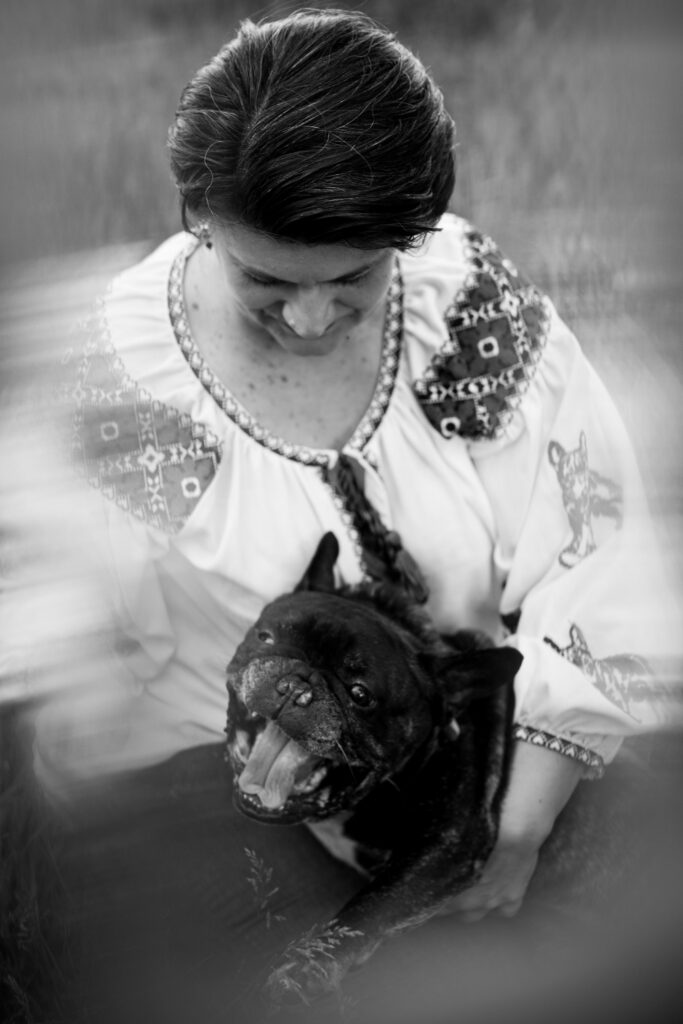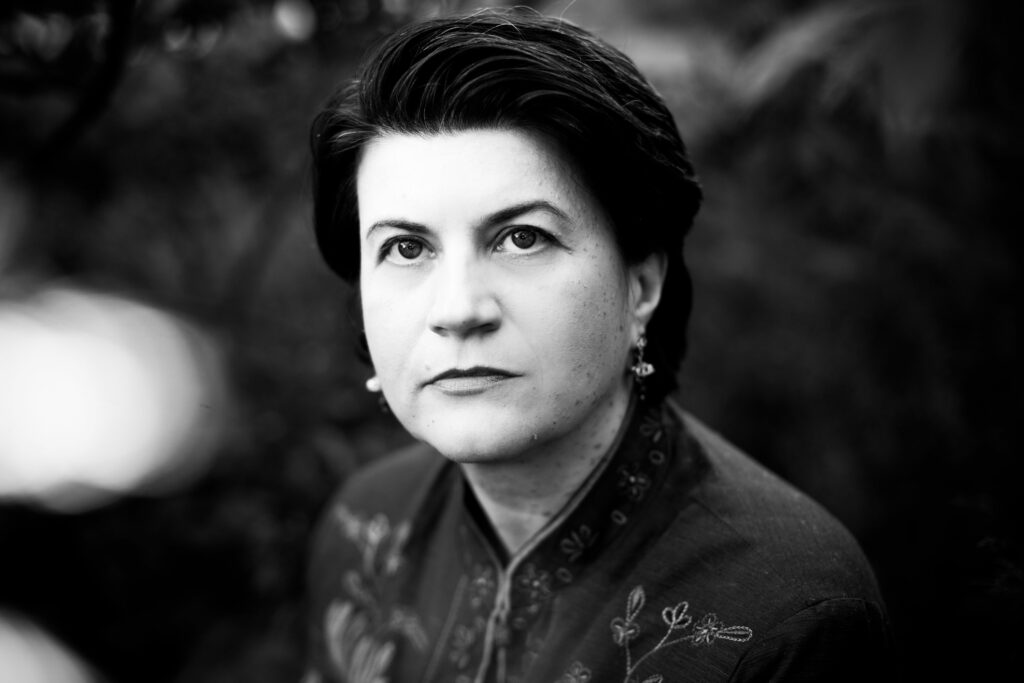
Russian occupiers are using psychological terror against us and we will feel those consequences — Larysa Denysenko
 Лариса Денисенко. Фото: Ольга Закревська
Лариса Денисенко. Фото: Ольга ЗакревськаWe spoke about the war and the traumatic experience that our society is currently going through.
Larysa Denysenko is a Ukrainian writer, lawyer, human rights defender, and TV and radio presenter. When the full-scale war began, Larysa Denysenko remained in Kyiv, surrounded by fighting, with her elderly parents and a dog. In Obolon, where the writer lives, Russian DRGs broke through several times and loud sounds of fighting could be heard. However, in mid-March, she joined a group of lawyers working with victims of sexual crimes by the Russian occupiers. This is a conversation about the traumatic experience our society is going through right now.
Anastasia Bahalika: During the first months of the war, reading your posts and those of other people who remained in Kyiv, I had a feeling of my own helplessness. There was this understanding that you can’t do anything. The first months were extremely difficult for all of us. Has the morale changed now?
Larysa Denysenko: You know, what you’re talking about, psychologists call this witness syndrome – when we would like to help, but we can’t, and it is painful. I also had this condition when I was watching the occupied cities: Kherson, Mariupol, and Severodonetsk. I understood that I could only help the families who left those cities or give money to volunteers who are trying to transport medicine and other necessities. I couldn’t do anything else. This is psychological terror, which the Russian occupiers are using against us. We will deal with the consequences, but some people may already be dealing with them. In fact, the whole country, especially people who were abroad, will still deal with this in the future.

If we’re talk about me personally, the closeness of my district, where shelling began on February 24th and then there were battles nearby, this closeness was difficult to understand. Evrything roars around you, the whole sky growls and sounds seem to be coming from everywhere. It took me a while to learn how close it is. In Obolon there were several breakthroughs by sabotage and intelligence groups. Until you read or hear about it from somewhere else, you don’t know that this is just a small group that was quickly stopped.
I went there after I had Covid. I had my 84-year-old father and mother in my arms and only a fifth of the residents remained in the house. We went for a walk with my dog and stood in line for potatoes. I remember queues for potatoes only in Soviet times when I was a teenager. Back then the car brought potatoes, people stood in line, and then they had to «hunt» for carrots for more than a week because there was almost nothing in the stores. For example, our glamorous Silpo grocery store had only boxed oranges, avocados, and guacamole, and that was it.
You begin to perceive everything that happens to you on a physical level. When the sky trembles from artillery strikes, when you see for the first time a rocket flying past your windows, or when your mother, who has difficulty hearing, sees it too, and how the fear comes to her, a partially deaf individual.
- This is the understanding of the closeness of death, such a strange death that I could never even imagine.
Artillery almost completely destroyed the suburbs throughout March, but I remembered the day when it suddenly became quiet for three hours. It was a warm enough day for March, and it was possible to evacuate in this silence, without shelling. Part of the people from the suburbs managed to leave, while others were then evacuated under artillery fire by volunteers. As a witness of those events, I could imagine all of this by the sounds.
In April, when the occupying forces were driven away from the capital, I was very frightened by this silence, which I was not used to. You go and you can’t understand how long it is – you can’t believe it. Already at that moment, I joined the work of helping victims of sexual violence. I went to the district around Bucha and I understood what was happening there. It helped me switch from my bodily experiences of war, which I had in March. At the same time, the battles in Mariupol were in full force, these are painful and tragic events. I had enough time to reflect and I reflected. It was very difficult and painful to accept it all. It was difficult to perceive the destruction of universities in Kharkiv and of Kharkiv itself. The destruction of culture, the stealing of grain, the erasure of identity from children and adults, and the filtration camps.
However, when people started returning to our district and to our building sometime after the 10th of May, life began to return. My blood began to move faster in my body, and I stopped feeling cold. The city which was drained of blood began to return to the pulsation of life. Now, as we speak in July, it is perceived differently. I, of course, cannot see the future, but I have already begun to plan for the week. This is done cautiously, not like before the war, but still, I do what I could not do before.
Anastasia Bahalika: I still cannot understand how this fear, destruction, and despair are combined with the tenderness, euphoria, and sublimity that society is experiencing now.
Larysa Denysenko: We are in a state of fear and of terrible danger. We are affected by adrenaline, euphoria, and crazy pride. I don’t remember when in my life I even watched, for example, figure skating performances. When our athletes from Kharkiv escaped under fire and won the program at the competition, I just cried. I could not hold back tears from this power of spirit. Although I used to treat such pathetic things quite ironically, it is impossible not to feel pride when you see children in the district singing «Red viburnum», or from the way fighters and soldiers fight at the front, or from the daily work of surgeons and doctors.
I am very responsive to symbols and now, when you see the ribbons, embroidered ornaments, songs, and memes that social networks are frantically generating, it helps to believe in victory. It makes me feel that we can feel a kind of crazy love for each other in parallel with the state of survival and struggle. In parallel with this, of course, there are many people under a shell, who have closed themselves in a state of preservation of their life and psyche. Now in the fifth month, we have all learned to adapt, but I still have emotional pits. I call this state «in the trench» when something has covered me. I imagine that I am in a trench where I must serve a certain time, in order to be more effective and be able to help people.
Anastasia Bahalika: I have heard from many people that Russia uses sexual violence in war as a tool of demoralization. Do you feel the effect of this demoralization on yourself?
Larysa Denysenko: Yes. Of course, I feel this. I work with a psychotherapist who specializes in trauma, such as the trauma of survivors of sexual abuse. I was finally prompted to turn to a psychotherapist after one incident. I was riding the subway and saw two teenage girls with very beautiful wheat-colored hair. One had a mental disability as it was visible from her exterior. They were very beautiful and very young. I looked at them, and a picture appeared in my head, of how they were being dragged to the basement. I never looked at girls and young women as potential victims of sexual violence. That’s how I understood to stop and do something about it.

When you’re dealing with sexual violence in war, choosing your words is very important. Here you can go back to the story with the inappropriate communication of the former human rights commissioner. When you read, you grasp the scale, you understand defenselessness and helplessness, you go into detail, and it’s easy for you to imagine yourself, your daughter, your friend, or your mother in this place. In fact Russia’s sexual violence, which we cannot help but talk about, causes psychological violence for absolutely every woman, every person who reads about it, learns about it, and feels as if it almost happened to themselves. We are now extremely sensitive to such things. We can easily imagine, for example, the occupied Izyum and Kherson, and the horror in which people live and how they are saving their own lives. I try to mentally hug the people under occupation. This helps me a little bit mentally.
The creation of media material took place within the framework of the project «Promoting Social Cohesion in Ukraine / Paragraph 7», which is implemented in partnership with the American Bar Association Rule of Law Initiative (ABA ROLI), the NGO «Center for Civil Liberties» and CF «Vostok SOS».


